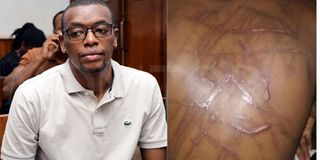Prime
Ugandans hoping Kakwenza’s scars mark turning point

Some of the torture marks on Kakwenza’s back. PHOTOS/ DAVID LUBOWA/COURTESY
What you need to know:
- Some of the torture victims say the wounds they grapple with are not just physical but also psychological.
Ghastly images of novelist Kakwenza Rukirabashaija’s scarred back and his chilling revelation that—among other torture methods meted out—a pair of pliers was used to rip chunks of flesh from parts of his body shocked Ugandans to the point of uncharacteristic anger.
The satirical writer was held incommunicado at the backend of last year right through to the first workweek of 2022 after posting tweets that were deemed to have attacked the person of President Museveni and his son, Lt Gen Muhoozi Kainerugaba.
Speaking with a refreshing candour to NTV Uganda, Mr Rukirabashaija, 33, said the traumatising experience made him think of “denouncing my Ugandan citizenship.”
He also admitted to being pushed to the precipice, saying at one point in time “I thought I was dying.”
His gripping account of torture spread so rapidly and damagingly, with the European Union delegation in Uganda calling for “those who violate the laws of Uganda [to] be held accountable and personally liable for their actions.”
Mr Rukirabashaija was supposed to make an appearance on a Twitter space put together by the African Institute for Investigative Journalism this past week. His lawyer, Eron Kiiza, however, belatedly revealed that the doctor had recommended bed rest for the ailing novelist.
Turns out Mr Rukirabashaija was actually planning to flee the country, which he successfully did on Wednesday (he later tweeted, asking the presiding magistrate— Dr Douglas Singiza—to “put my passport in the dock and try it.”).
Earlier, an attempt to have Mr Rukirabashaija’s aforesaid passport returned to enable him access medical treatment outside Uganda was met with rejection.
The novelist’s absence on the Space did not deter people in their thousands from converging. Discussions on the platform were set against the sentiment that torture should not be viewed through the lens of being a moral problem.
“Torture is not a weakness of Museveni’s government. It is a strength of his government. He came to power through violence … and holds power using violence,” Ivan Okuda, a lawyer-cum-journalist said, adding that redress cannot be sought elsewhere because “you cannot use institutions that have been captured and have become victims themselves.”
Speaking out
Dr Stella Nyanzi, who says she suffered a miscarriage while in detention, addressed herself to the aspect of voice and victimhood. The researcher hopes that Mr Rukirabashaija’s experience can “build a trigger” that climaxes in “citizen action involving both the elite and the masses.”
She said previously all odds pointed to a culture of silence holding sway because of the “condemnation of those of us who have experienced torture at the hands of the state.”
The “egalitarian approach that involves the masses” proffered by Dr Nyanzi chimed with Andrew Karamagi who bluntly identified a dichotomy between “accept[ing] this kind of misrule … or reject[ing] its totality.” Mr Karamagi, a lawyer, said silence has an immediate effect on the sense of duty of both the elite and masses. He added: “Oppressive systems can live on for years or centuries if nothing is done … we have to go the full nine yards and rid ourselves of this illegitimate regime.”
Government functionaries on the Space—such as the spokesperson, Mr Ofwono Opondo—opted to be listening posts. Mr Duncan Abigaba, the deputy director of the Government Citizen Interaction Centre, which on its official website describes itself as “a key contact centre between [the] Government and citizens” took part in the conversation albeit with elaborate caginess.
“The President (Museveni) has been very categorical and he has said you cannot extract relevant evidence through coercion,” Mr Abigaba said, adding, “The closure of SID Kireka is a step in the right direction.”
The Uganda Police Force released a statement on Tuesday, affirming that “the Special Investigations Division (SID), Kireka … is still open and fully operational.”
Regardless, Mr Nicholas Opiyo says “closing [SID] does not solve the problem.” Much like the closure of the Rapid Response Unit (RRU), he expects any such development to be merely a “cosmetic” exercise. What would be worth its weight in gold, the human rights lawyer said on the Space, is if the sense of victimhood comes out strongly.
“If you keep quiet, you embolden these kinds of people,” Opiyo said of people who mete out torture, adding, “The protection of the state is transient. There will be a time when these people will be held to account. So documentation is really important.”
Badge of honour
For now, Mr Rukirabashaija proudly wears his scars as a badge of honour. In one tweet, he said: “Regardless we smile.”
Dr Nyanzi, who like Mr Rukirabashaija says her “kidneys were found to be infected with toxins” after her incarceration, revealed that the wounds of torture victims grapple with are not just physical but also psychological.
For one, she does not find herself in the right headspace “when sirens [go] off.” Yet—much like Mr Rukirabashaija—she wears a smile regardless.
“Our voice will not be taken away from us. Our ability—however small—is important,” she told the Space, her voice breaking with emotion from her abode in Germany. “We are the ones to liberate ourselves from these torturers.”
While Mr Abigaba said President Museveni has condemned torture in the strongest terms, Sarah Bireete from the Centre for Constitutional Governance was quick to note that the latter “pays lip service to torture.”
She cited when—in a jocular manner—he took great pride in Opposition leader, Mr Robert “Bobi Wine” Kyagulanyi Ssentamu being beaten “properly” whilst in detention.
Mr Okuda said Uganda will continue going round in circles if it does not “approach this as a political problem [as opposed to] a moral problem.”




